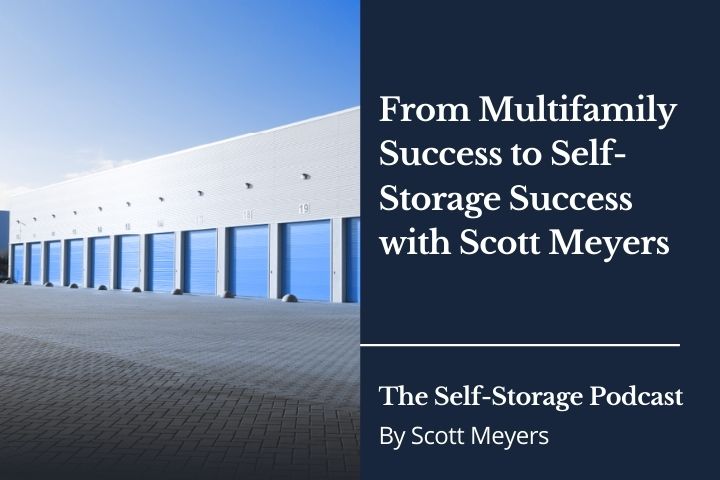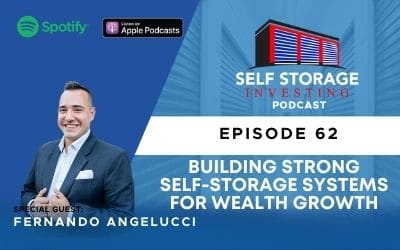In this episode we meet the new President and COO of Kingdom Storage Investors and Self-Storage Investing, Anne Mari Decoster. She’s lived a professional life thinking forward. In her first role out of post secondary school she was part of an analytics team that predicted the economic demise of the Soviet Union during the Cold War. It also studies how technology was changing and would impact consumers. For example, it was becoming clear batteries were getting smaller and more powerful which would ultimately lead to the smaller smart phones we use today.
She uses that mindset to think about self-storage in the future. Imagine a driverless vehicle going to a smart access facility, the gate opens, then closes. The vehicle drives up to a unit and the door opens and pre-packaged boxes with barcodes help manage which boxes are needed. But what happens next? It’s not the last mile of automation investors need to understand… it’s the last ten feet.
WHAT TO LISTEN FOR
Why it’s so important to watch for regulatory changes that can impact business fees
Why using technology to meet consumer demands is critical and how that changes your investment approach
Why the independent software code developer is more valuable than ever
Why Open API is so important
This episode was recorded live at the Self-Storage Mastermind in July 2023 in Keystone, CO.
ABOUT ANNE MARI DECOSTER
President and COO Kingdom Storage
Graduate Georgetown University
Background in business with companies of all sizes from Fortune 500 to small business.
CONNECT WITH ANNE MARI DECOSTER
annemari@selfstorageinvesting.com
On Instagram: @annemariedecoster
On LinkedIn
CONNECT WITH US
Website: https://www.selfstorageinvesting.com
Facebook: https://www.facebook.com/selfstorageinvesting
Twitter: https://twitter.com/SelfStorageGuy
LinkedIn: https://www.linkedin.com/in/scottameyers
YouTube: https://www.youtube.com/user/SelfStorageInvesting
Instagram: https://www.instagram.com/self_storage_investing
Follow so you never miss a NEW episode! Leave us an honest rating and review on Apple or Spotify.
Episode Transcript
Anne Mari Decoster (00:00):
To join a team that knew how to look into the future and then how to take the ideas and implement them was, it was fascinating. It was thrilling, it was exhausting. And I realized I didn’t want to do it for the rest of my life because Washington DC really is a swamp.
Announcer (00:27):
This is the Self Storage podcast where we share the knowledge and skills from the industry’s leading investors, developers, and operators to help you launch and grow your self, self-storage business. Your host, Scott Meyers, over the past 18 years has acquired, developed, converted and syndicated nearly 5 million square feet of self storage nationwide with the help of his incredible team at selfstorageinvesting.com, who has helped thousands of people achieve greatness in self storage.
Scott Meyers (01:04):
So here we are. Here we are. Great. Welcome to the podcast. Welcome to Self storage investing.com. I wanted to have this interview in front of our mastermind here live to not only introduce you to the group, but also Self Storage Nation at large in podcast land as well. And so we thought we would introduce you to the entire community at once. So we are so happy to have you on board. Tell us a little bit about, first of all, what is your role? Give us your job description as you see it right now.
Anne Mari Decoster (01:31):
Thank you very much. It’s a pleasure to be here and it’s honestly such a pleasure to be a part of this community. I joined you, I’m very fortunate to have joined you as the president and COO of your affiliated companies, which is your companies in education, in investing, and in the assets themselves. So storage, investing, the Mastermind and Kingdom storage partners.
Scott Meyers (01:53):
Good. I’m glad that your description matches ours as well.
Anne Mari Decoster (01:57):
Good.
Scott Meyers (01:59):
We’ve got some exciting things happening as we’re heading into this next phase in self storage and there’s only so much of each one of our staff members to go around. And as you’ve seen in our lengthy courting process and looking at whether there’s a fit between you and our company in that role, the goal is to have you step in to take over some of the responsibilities that I have on my end. My role is to be mainly the visionary and cast where I feel that the industry is going and then how we fit into that and then make those decisions and guide the rest of the staff. And good or bad, I can’t say that I’ve succeeded at that in all areas, but knowing that regardless, there’s still more attention that needed to be done there. And so we are so thankful to have somebody of your caliber to now take over and make those decisions. So that frees me up to do the things that I feel I need to do, which is within, call it my superpower or not, it’s where I want to be, and that’s raising capital to grow the business. And so we are thankful to have you in those roles.
Anne Mari Decoster (02:56):
There are a lot of people who are thankful for it because when you operate in your sweet spot, oh my gosh, it’s powerful. And so having more of that freeing up your time so that you can do the things that you’re extraordinarily good at is going to be good for us
Scott Meyers (03:11):
All. Yeah, well, they’re all happy as well because now they finally get answers to their questions that they, well, I try. So tell us a little bit about your background and how you got to the place with the experience that you’ve had in self-storage and even prior to that, a little bit of background on your very storied history.
Anne Mari Decoster (03:29):
Well, I was fortunate enough to have a fantastic job coming right out of college. I joined Booz Allen Hamilton’s war gaming team, and it was at the end of the Cold War, which most of us didn’t know, but the intel made it very clear that the Soviet Union was broke. And so the question was what will the world look like in the future? And I got to be part of the team that prognosticated that We looked out into the future and tried to determine what will be the needs and how can we meet those needs. And then also was able to be part of the more tactical, more boots on the ground research and development to take the ideas and then move the science to technology, the technology to weaponization, weaponization to commercialization. And if you’re wondering what I’m talking about, you all have a cell phone, you have a smartphone.
(04:18):
Back in the day, phones were much bigger than that, weren’t they? And it was all a question of batteries. So batteries, what we spent a lot of time on, drones came out of this research exoskeletons. A lot of really fascinating technology that helps so many people these days. And being able to do that kind of work to join a team that knew how to look into the future and then how to take the ideas and implement them was, it was fascinating. It was thrilling. It was exhausting. And I realized I didn’t want to do it for the rest of my life because Washington, DC really is a swamp. So getting out of the swamp brought me to Phoenix, Arizona where I got married and had a family and life brings a lot of things. And in one of those troughs that life brought me a friend was talking to someone, it was at a church, and this happened to be a developer who said to her, I just need help.
(05:17):
And so she called her daughter, her daughter called me. I called him. We had lunch the next day and the day after that I was writing his business plans for self-storage. He had several assets in the United States and was looking to go to Hong Kong, China, Japan, Guam. So we actually wrote business plans before there was any storage in most of those places way back in the 19, just after the turn of the millennium, 2000 2, 3, 4. And then also I helped him run his portfolio here. Each one of them exited with a fabulous exit market, high sales. And so learned basically all the business from concept to exit from him. That was Greg Kreen pack with Huka Pacific Development and then had the opportunity to run a state association there in Arizona. And then again, someone needed help. I asked a friend, so how’s this new venture you’re doing called Store Local?
(06:15):
And the answer was, man, we just got the best idea. I need a business plan. I don’t have time to write it. Well, I’ve basically been writing business plans since the 1980s, and so started writing business plans for that organization and they asked me to join them to implement them, which I did. They’re up and running. They’re strong, they’re going, going strong. And so it was great to start talking to Scott about a new challenge with a company that basically will gives hope to people in the industry. People, you don’t know this, but the mastermind are you’re an organization. People watch and they look at you and they say, maybe I can do it too. Maybe there’s a way for me to get in. How can I get in? How can I be like them? How can I do what they’ve done? And I don’t know that you know what a beacon of hope you are for people who have not yet made it, who have not yet entered who want to enter. And to be able to help more of those people succeed in this wonderful industry, it motivates me every single day.
Scott Meyers (07:16):
Well, again, we are so happy because of the incredible pedigree that you have and being able, we’re not as exciting as war games. So storage is exciting.
Anne Mari Decoster (07:25):
You want to do a war game? We can do a war game.
Scott Meyers (07:28):
Let’s save that for the second podcast. How about that round Two, how’s that? But the experience that you have and really the approach that you take to looking out in the future and anticipating which you’ve had that experience in award gaming and working here, Washington, DC and others, and in the business plans in anticipation of looking forward, this is a, self storage is a pretty static industry. There’s not a whole lot of this really shaken this industry up mean. We have economic cycles and the capital stack changes kiosks were probably the biggest change that we’ve seen. And then going to unmanned
Anne Mari Decoster (07:59):
Robert Cheney’s first one,
Scott Meyers (08:01):
And we bought into that very early on as well. But outside of that, there’s really not a whole lot except we are looking at seeing some changes here in this country in our industry. There’s some threats that we potentially see that maybe, oh, personal storage like an Uber of self storage and some other things that we’ve been talking about here at this mastermind and else and elsewhere. But what are some of the trends, maybe some of the threats or opportunities, all of those that you’re seeing as you look out across the landscape after being in the industry for 20 years now.
Anne Mari Decoster (08:32):
So technology is a game changer, and it is certainly changing our game. We were talking in the back table about marketing and folks have been talking from the stage here at the Mastermind and also among the tables among yourselves about AI chatbots, about remote management, about using software to solve problems, to connect one piece of technology to another. That is a game changer. The way we have done business in the past is it doesn’t work anymore because Amazon has trained the American consumer to expect a certain level of service. And if we don’t offer that in our office, which is our consumer website, they’re going to go on to another website that will offer that to them. So if you think about your consumer website where your prospects find you 80% of the time, think of that as your office. Remember how much attention you used to pay to your office, how it looks, how it smells, the coffee, the donuts.
(09:30):
Well, that’s the kind of attention you need to pay to your website these days. And adding the different features that make it more powerful, make you more powerful all also there are some, well, so that is a threat in and of itself because if you don’t do it and everybody else does, you will be left in the dust. Fortunately, the people in this room, the people in the mastermind are already looking at that. They’re already implementing it and they’re all, they’re already iterating it. So you’re improving it. But some of the risks that we don’t control, some of the threats that we don’t control, they’re coming from planning and zoning. They’re coming from local government, they’re coming from state government because so many government entities are hungry. They’re looking for money, and they know all of the wannabe investors that this is a very profitable industry.
(10:19):
And so they’re changing the way they regulate. For instance, a business tax, a business license that used to be $300 a year can be changed into a progressive tax that can cost between $12 thounsand and $25 thousand a year. That just happened in California. One municipality did it, two or three others are already copying them. So the kind of risks that we’re facing on a local level, they’re mounting. And if I always support state associations and I’m going to put a plug in for them now, whatever states you’re operating in, you should be a part of the state association because there are deep pockets that can help us with lobbying and the self storage association certainly does, but they can’t do what you can do because you have addresses in muni districts and your home address, your business address, your manager’s address, those you all constituents, and you have a much more powerful grassroots voice when you go to the legislature, when you go to the planning and zoning, when you go to the regulatory boards because they don’t want to hear from REITs. They don’t want to hear from businesses that don’t have local roots. So I encourage you to be active members of your state association. So I know a lot of you already are,
Scott Meyers (11:36):
And I would echo that as well. I think one of the most overlooked returns on investment to we can have is the small amount of dollars that we send back to the state associations for what they do on our behalf in terms of lobbying. And we’ve seen it, you’ve read it in the magazine several places where they’ve thwarted bills that would just be crushing in some instances and others just a mere nuisance. But for that, I will write that check happily every single year to belong to our state associations for what they do.
Anne Mari Decoster (12:03):
It’s a kind of funny comparison, but most of us don’t think about in terms of national security, is that the best service that we have? We never even hear about because terrorism is effective when you hear about it. So if you don’t hear about thousands of attempts that are thwarted, that’s actually a victory. And that’s what state associations do. They have defensive measures to prevent business unfriendly regulations from impacting your business. Most of their victories are in defense against bad regulations as opposed to victories like modernizing the lien laws. Those are few and far between, but the defensive winds, they outnumber the offensive victories, probably five to one.
Scott Meyers (12:48):
So there are many threats that are facing us and always and new ones that are unforeseen. And so again, also being part of those state associations and being plugged into masterminds and communities like ours brings those awareness. We just learned to hear the past couple of days about some unfair language to borrowers that showed up in some lending documents that is going to hopefully save a few folks from making some big mistakes by not looking at our legal documents, but shifting from those and always keep being mindful of them. Henry, what do you see as the biggest opportunity in front of us right now as an industry
Anne Mari Decoster (13:23):
Using technology to meet consumer demands is critical. And fortunately, we don’t have to invent that wheel. We have to watch people who do it well and copy them. A lot of times it’s not the first person who makes the money on a new idea, it’s the second person because the first money, first person runs out of money and the second person can go in and buy it low and then iterate on their great ideas. So we see all of the REITs buying remote portfolios, they’re doing that so that they can figure out how it works and how to scale it. We have people in this room who are already doing that, which is terrific. I love the talk that we had about the various questions and the answers we’ve had about writing your own code to patch technology together because there’s no technology provider who’s going to be able to anticipate all of your needs or even want to solve for all of your needs. But you can hire code writers who can, software development is easily available, especially since covid because a lot of the software writers, the software code writers left their big companies and they became independent. So you can hire one person now instead of an entire team. And I mean that’s a huge opportunity just in and of itself. But I think using technology is effectively is our biggest opportunity to continue to succeed.
Scott Meyers (14:45):
I think you’re right in the fact that not only is tech going to change things, but also we don’t have to be the first. We can look to other industries and also other parts of the world that are also doing storage and doing business very similar to ours. We’re becoming a society not just here in the US but worldwide that we just want the done for you fewer if fewer pickup trucks are being sold because people don’t want to haul stuff, they want to do anything. And that is trickling down into our industry as well. We’re seeing that people don’t want to put stuff in their car and even take it to storage. They don’t want to walk into a three story self storage facility and get out of freight elevator anymore. The premium units are the ones that are at ground level and people now, they just don’t even want to drive to the facility.
(15:26):
And so our industry is rapidly changing towards one where it is app based, it looks more like Uber Eats and somebody shows up and either picks up your stuff or they pack it up and pick it up and take it over to storage. And now location isn’t as critical as it used to be in all instances. It doesn’t have to be within one to three miles. It just means that this person is who you look at, the app is a real close by and you click on the button and he or she comes and picks up your stuff and takes it to who knows where all is that with a flick of a button, they’re going to show up tomorrow with your stuff when you want it back again. And so that in terms of technology, I think is going to change, call it dramatically or not.
(16:04):
But then also AI and we also had a presentation on that this week as well. And that is going to change all facets of all businesses and those who adopt that early, who dig in and learn how to implement that to reduce expenses and get ahead of the game and just quite honestly move faster, are going to have the advantage in the beginning. Some are going to fall behind and it’s going to be everything else we’ve seen in self-storage from those owners that put a website in place in the beginning to those that didn’t, well the ones that they fell behind. And I think AI is going to have that a big shift very early on that’s going to be a competitive advantage for those that are willing to dig in and learn.
Anne Mari Decoster (16:42):
Absolutely. We were talking about it at the marketing table just in the last session, and if you can have an AI chat bot on your website that answers 93% of inquiries without human intervention intervention, without human involvement, think about how many hours that saves on the phone. That’s a lot of labor hours saved and you get the immediate satisfaction that the consumer’s looking for. So that’s one example about how it’s already happening. I B M thinks that 30% of healthcare tasks can be automated by chatbot tech, ai, chatbot technology, healthcare tasks are very complicated. Self storage tasks are not complicated. How much of our regular tasks can be automated? A lot of them. But one of the challenges in our wonderful industry is that it’s not enormous. There are 800,000 restaurants in the United States. There are only about 55,000 self-storage properties. So how much money is there available to write technology, to write code specifically for?
(17:48):
And that makes the independent software code developer even more valuable to us, especially with younger people coming into the industry who are digital natives. And when a problem is posed, their first thought is how can AI solve that? I love that approach. I mean, I find myself when I’m on a website that has a chat bot and doesn’t answer me right away, I find myself getting aggravated. I mean, I wasn’t grow up with AI chat bot technology, but if I don’t have an immediate answer, I’m wondering, well, what’s wrong with you? I want my immediate answer.
Scott Meyers (18:23):
That’s where we’ve gotten to the done for you in all instances, from information to tasks being done. And it’s exciting.
Anne Mari Decoster (18:29):
It is. When I joined Booz Allen and Hamilton, there was this nerdy guy who sat in office right next to the partner and I asked him, Fred, what do you do? I do artificial intelligence. Artificial intelligence, tell me what is that? I got to know what is fake intelligence. And so he told me that it had already been in development 20 or 30 years. This was in the 1980s and now it’s coming to fruition. I mean if you look at the COvid 19, the vaccination, that was the culmination of 60 years worth of technology being developed in many different verticals. It happened like that, but that was after 60 years of research and development, the kind of stuff that we did back when we knew the Cold War was going to end and the word Jihad was a totally new vocabulary word to all of us.
(19:23):
But when you do that thinking now and you look out into the future, you know, might think it’s going to be 20 years, but it turns out to be five or maybe it turns out to be two. So looking out to imagine what is the consumer going to want? I mean, you just actually leapfrogged ahead of the consumer journey. Because when I think about people who don’t want to move their own stuff, I think about a driverless car going to a smart access, driving itself to a smart access facility, gate opens, gate closes, driving up to a unit door opens, what happens next, the last 10 feet. How do you automate the last 10 feet? Does a human being unpack it all and stack it? Is there technology to do that? Is there machinery to do that?
Scott Meyers (20:12):
Yeah, well the only guess is it comes by way of pre-packaged boxes with barcodes on it. And this is the box that we want or that the consumer
Anne Mari Decoster (20:20):
Wants, but it still has to be moved.
Scott Meyers (20:24):
Yeah, understood. Yeah.
Anne Mari Decoster (20:25):
So it’s not the last mile automation, it’s the last 10 feet. That’s a fun challenge to think about. Solving
Scott Meyers (20:32):
Without a doubt.
Anne Mari Decoster (20:33):
Expensive. Don’t be the first second.
Scott Meyers (20:37):
So before we get too far ahead of ourselves and having a robots rule the world, what is the most exciting piece of technology that is in use today, either early adoption or is in use today that you’ve been a part of that you’ve seen that has been a game changer?
Anne Mari Decoster (20:51):
I think that there are several PMSs and PMS-like apps that are very exciting. And what is most exciting about them is that they have open a p i, which means that if you have Vertech or rise, which is really good at revman, you don’t have to develop Revman capability. You can integrate with that revman capability. Or if you have call center technology that someone has already developed and proven, then you don’t have to develop telephony or call center technology. You can just patch it in by way of integration. So I think open a p I is critical. I think it’s critical for the independent owner operator because monopolies are not your friend. The first monopoly in our industry was it was an orange one. It’s all U-haul really is the first one. And they have so much money that they just buy one of anything they like. And there are vendors who are doing similar things now in our industry. So the smarter and more demanding you are about what you want your technology to do for you, the better served you’re going to be and the more you can join together and amplify your voice, the better. So the integration of technology is what’s most exciting to me right now in the tech field.
Scott Meyers (22:15):
I think we see it out outside of technology, the benefits and the power of being integrated in terms of property management, bringing construction in-house, having control of fund management for the private equity, running a financial services company. If you’re raising private equity rather than outsourcing all of that, first of all, it’s a feather in your cap if you are raising private equity and working with partners to say that we control all those expenses because we own the company and it’s a pass through. So there isn’t a property management company and not to demonize any of them, we worked with many and that we continue to utilize property management companies when it makes sense to do so. But if we can, we have the ability to bring it in house. Property management companies, generally they charge a fee and they’re for a profit management to us is a necessary evil, but we utilize it to drive N O I.
(23:04):
And if we can reduce those expenses and increase income, that is our goal. And sometimes they compete. Same thing with fund management. Those companies are there to make a profit. We want it to be a pass through because ultimately our money is made by the power of the cap rate when we sell. And so that’s what we are looking to do. Conversely, when we’re looking at technology integration, I’m a shiny object guy, I admit it’s a hundred percent. And if there’s a new piece of technology, a new app, a new something, my staff says, oh, here he comes again with another one. And just like, I heard this podcast, I listened, I saw this demo. Let’s get it because it’s going to do all these things and you can find yourself being siloed and you have data pieces all over the place with no. And if you don’t, we’ve been talking a lot about this in the past couple weeks.
(23:49):
If you don’t have a dashboard, if you don’t have a scoreboard and nobody knows how to read the scoreboard and you don’t know how to make decisions from the scoreboard, then you’re going to lose the game. That’s right. Period. That’s right. And if you don’t have an integration of your data points, your technology to be able to make decisions from those, it’s just not going to work. So they do have to talk to each other and they do have to roll up to a number or numbers. And those are your KPIs, your key performance indicators. Anything else is a shiny object and it is a distraction
Anne Mari Decoster (24:18):
And you need to look at them on a daily basis. You need to look at your M S R for your properties regularly. And you need to look for where are your leaks, where are your weaknesses, where are your opportunities? We were talking about this earlier, it it’s critical keeping because right now we’re at a time when poor operations are not going to cut it. A lot of people who have entered the industry in the past four or five, six years had it really easy. And it was okay to be sloppy in recent past years. It’s not anymore. You have to have efficient, excellent operations or you’re going to get slammed online and you’re going to lose customers. So you said something the other day when we were talking that you were talking to a buyer about a beautiful class, a facility new, gorgeous, and it was one, and this buyer who had always been interested in the past wasn’t because he’s only going to look at portfolios, which that really weighs heavy on my mind because there are a lot of us who don’t have a portfolio, but we have individuals. And so how do you put the individual properties together in an appealing way to each individual owner into one portfolio buyer? It’s important.
Scott Meyers (25:32):
It is important. And we’re working on that. So more to come. So Ann, what is the one question that I should have asked you that I should have perhaps even, I’ll even give you liberty to talk about our company.
Anne Mari Decoster (25:45):
Okay, well, when I joined your company after several months of conversation, you know can kick the tires and you can check the oil when you’re in the talking stages, but you can’t really open the hood and check the engine until you’re part of the organization. And when I did that, what I found was the company is filled with people who love their jobs. They love what they do, they love the company, they love the founder, they love the industry. They love all of you. They love everyone that they work with. They love being able to help people make dreams come true. They’re hungry for more to be able to help more people. They’re hungry to problem solve. And I feel like I’ve died and gone to heaven. It is great to be in an environment like this. So thank you all for giving me that opportunity.
Scott Meyers (26:35):
Well, Anne Mari, I don’t think there’s anything I can do to top that over end this interview. So once again, we are so happy to have you on board and we know that the future is within our company and in the industry. And so we’re looking forward to really big things to come and working together with you closely to make that happen. So thank you. Thanks to you. Thank you once again. Thanks for taking time out today. Thank you. It’s been a pleasure.
Announcer (27:01):
Hey gang, wait three things before you leave. First, don’t forget to follow the Self Storage podcast and turn on your notification so you never miss another episode. And while you’re there, please leave us a five star review if you like the show. Second, be sure to share your favorite episodes and more via Instagram and don’t forget to tag us. And lastly, head to the links in the show description and hit follow on Twitter and Facebook to get a front row seat as we grow and scale our business and bring you along with us.















